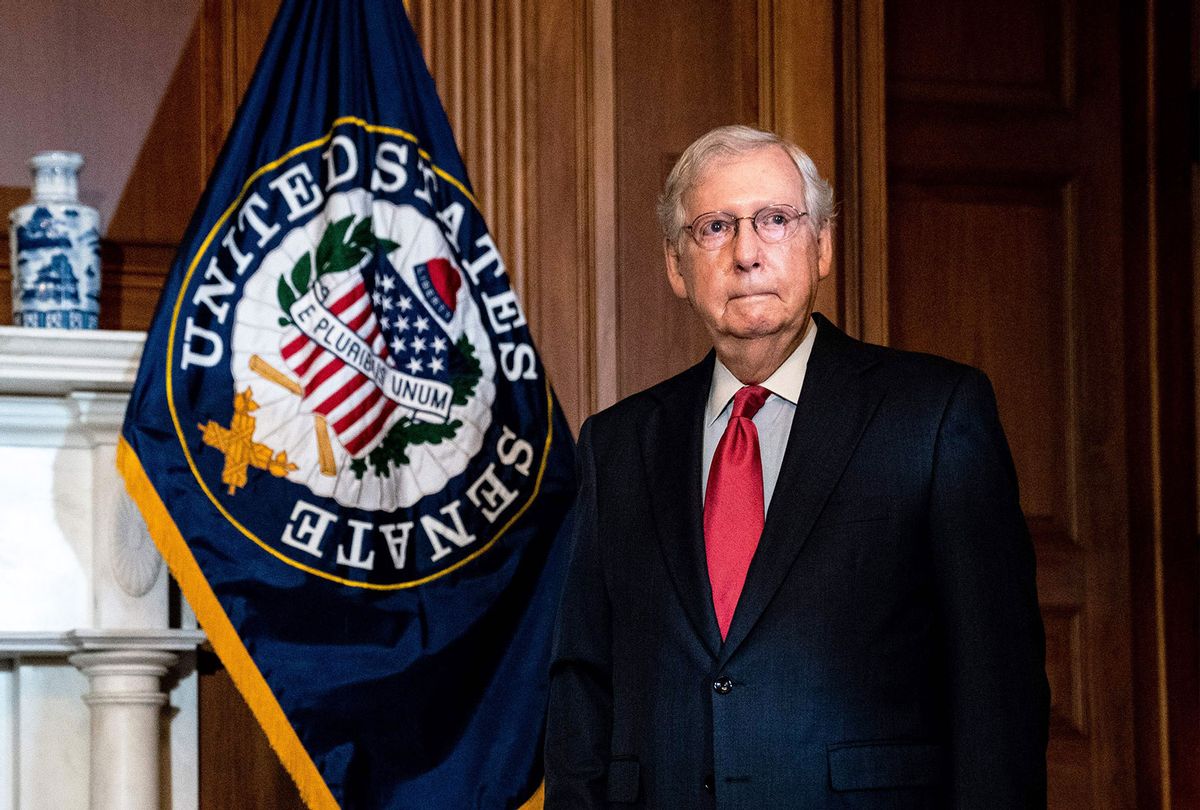Senate Majority Leader Mitch McConnell, R-Ky., torpedoed a possible compromise deal on the stimulus between House Democrats and the White House on Thursday.
Millions of people have fallen into poverty since aid dried up months ago, and Federal Reserve Chairman Jerome Powell has pleaded for Congress to provide more relief, because there is little risk of "overdoing" it. But McConnell on Wednesday said a deal worth between $1.8 trillion and $2.2 trillion was about four times more than Republicans would agree to — even though it is a far cry from the $3.4 trillion bill passed by House Democrats in May.
"I don't think so," McConnell told reporters when asked if he would agree to a deal in that range. "That's where the administration is willing to go. My members think half a trillion dollars, highly targeted, is the best way to go."
McConnell acknowledged that Trump had been eager to increase the price tag, but the bill being negotiated between Speaker of the House Nancy Pelosi, D-Calif., and Treasury Secretary Steven Mnuchin was "not what I'm going to put on the floor."
McConnell previously announced that he would force a vote on a $500 billion bill next week after House Democrats approved a $2.2 trillion compromise last month.
The majority leader's reluctance comes as studies show that roughly 8 million people have fallen into poverty after their stimulus payments ran out and enhanced federal unemployment benefits expired in July. One study found that 6 million people have fallen into poverty in just the last three months, with Black and Latinx people and children disproportionately impacted.
Powell warned Congress earlier this month that failing to pass another large stimulus package would "lead to a weak recovery, creating unnecessary hardship for households and businesses."
"A long period of unnecessarily slow progress could continue to exacerbate existing disparities in our economy," he said. "That would be tragic, especially in light of our country's progress on these issues in the years leading up to the pandemic."
Trump, who faces a steep climb in the polls with less than three weeks before the election, has signaled that he would also like to see a larger bill after failing to gain leverage by claiming to end all talks and urging the House to pass piecemeal bills, which have been blocked by his own party.
"Absolutely, I would. I would pay more. I would go higher," Trump told Fox Business on Thursday. "Go big, or go home. I said it yesterday, 'Go big, or go home.'"
But Republicans forcefully pushed back on the White House negotiations, even as the GOP heads into a perilous election season where the party has a strong chance of losing its Senate majority.
Republicans on a call with White House chief of staff Mark Meadows last week called the White House's $1.8 trillion proposal a "betrayal" and "the death knell for our majority" as senators took turns blasting the bill, according to Politico.
Mnuchin, who is still negotiating a possible deal with Pelosi, acknowledged earlier this week that "getting something done before the election and executing on that would be difficult just given where we are." Further, Democrats doubt that Trump will still have much appetite for a large deal after the election if he loses.
"My fear is that if Trump loses the election, we're done until February because he's not going to be in any mood to help or cooperate with anybody," Rep. Tom Malinowski, D-N.J., told The Washington Post.
The biggest sticking points in the deal have been Democrats' demands to include much-needed aid for hard-hit cities and states and child tax credits for working parents, as well as the Republican demand to include lawsuit protections for companies in the bill.
Ian Shepherdson, the chief economist at Pantheon Macroeconomics, predicted that McConnell had been so reluctant to go up on the price of the bill because he expects the president to lose the election.
"I think McConnell expects Trump to lose, and therefore for him to spend political capital to support Trump by forcing through a bill which would put his leadership position at risk after the election, to me, doesn't make any sense," he told Business Insider. "It's always wise to do things from McConnell's personal perspective, because that's how things operate in the Senate. He has enormous personal power, and he wants to be leader again — even if he has to be a leader in the minority."

Shares